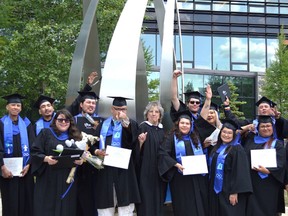Education
Manitoba Invests $4.5 Million in Indigenous Language Programs

The Manitoba government has announced a significant investment aimed at revitalizing Indigenous languages. The province is committing over $4.5 million to establish two new university-level degree programs focused on training fluent speakers and future teachers of Indigenous languages. This initiative was unveiled by Premier Wab Kinew and Advanced Education and Training Minister Renée Cable on Friday, marking an important step in preserving Indigenous languages for future generations.
Premier Kinew emphasized the cultural importance of this initiative, stating, “Preserving the Indigenous languages of our province means passing them on to future generations. Indigenous youth will be healthier if they can speak the traditional language of their communities.” The programs aim to develop a new generation of fluent speakers who can uphold Manitoba’s Indigenous traditions.
Investment in Education
The University of Winnipeg will receive $2.3 million to establish a bachelor of arts in Indigenous language immersion, specifically in Anishinaabemowin (Ojibwe). This program stands out as the first of its kind in Manitoba, targeting second-language learners and aspiring teachers. University president Todd Mondor noted that this new initiative builds on the institution’s ongoing commitment to Indigenous education. He remarked, “Led by accomplished Indigenous language scholars and speakers, this work will have a profound and lasting impact as we move forward on the path of reconciliation.”
The program is expected to address the need for immersion teaching positions throughout the province, enhancing Indigenous language education in schools at all levels.
In northern Manitoba, the University College of the North (UCN) will receive nearly $2.25 million to launch a bachelor of Indigenous languages program focused on Ininimowin (Cree). This funding will also support the conversion of campus space into a Centre for Aboriginal Languages and Culture. UCN president Doug Lauvstad described the launch as “a profound and historic moment” for the institution and its surrounding communities.
Lauvstad added, “By actively engaging in language revitalization, we are not just teaching words; we are empowering communities to reclaim and strengthen their cultural identities.”
Looking Ahead
Minister Cable highlighted the broader impact of these programs, stating they will equip students to lead language revitalization efforts within their communities. She noted, “They will support students in becoming future Indigenous language teachers, increase opportunities for learning in both northern and urban communities, and help students strengthen the cultural and linguistic foundations that will shape future generations.”
Both programs are scheduled to commence in January 2026, with student enrollment currently open. This initiative aligns with the implementation of the Public Schools Amendment Act (Indigenous Languages of Instruction), which seeks to incorporate Indigenous languages into classrooms across Manitoba at all grade levels.
The Manitoba government’s investment not only aims to preserve Indigenous languages but also fosters cultural identity and community empowerment.
-

 Science3 months ago
Science3 months agoToyoake City Proposes Daily Two-Hour Smartphone Use Limit
-

 Top Stories3 months ago
Top Stories3 months agoPedestrian Fatally Injured in Esquimalt Collision on August 14
-

 Health3 months ago
Health3 months agoB.C. Review Reveals Urgent Need for Rare-Disease Drug Reforms
-

 Technology3 months ago
Technology3 months agoDark Adventure Game “Bye Sweet Carole” Set for October Release
-

 World3 months ago
World3 months agoJimmy Lai’s Defense Challenges Charges Under National Security Law
-

 Lifestyle3 months ago
Lifestyle3 months agoVictoria’s Pop-Up Shop Shines Light on B.C.’s Wolf Cull
-

 Technology3 months ago
Technology3 months agoKonami Revives Iconic Metal Gear Solid Delta Ahead of Release
-

 Technology3 months ago
Technology3 months agoApple Expands Self-Service Repair Program to Canada
-

 Technology3 months ago
Technology3 months agoSnapmaker U1 Color 3D Printer Redefines Speed and Sustainability
-

 Technology3 months ago
Technology3 months agoAION Folding Knife: Redefining EDC Design with Premium Materials
-

 Business3 months ago
Business3 months agoGordon Murray Automotive Unveils S1 LM and Le Mans GTR at Monterey
-

 Technology3 months ago
Technology3 months agoSolve Today’s Wordle Challenge: Hints and Answer for August 19









